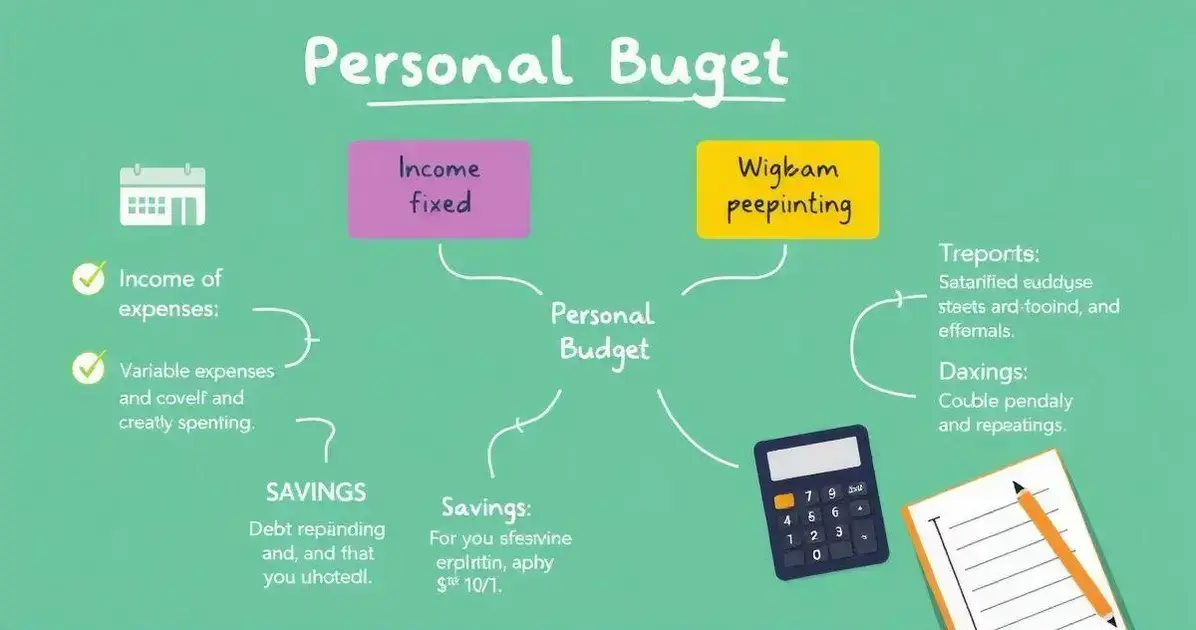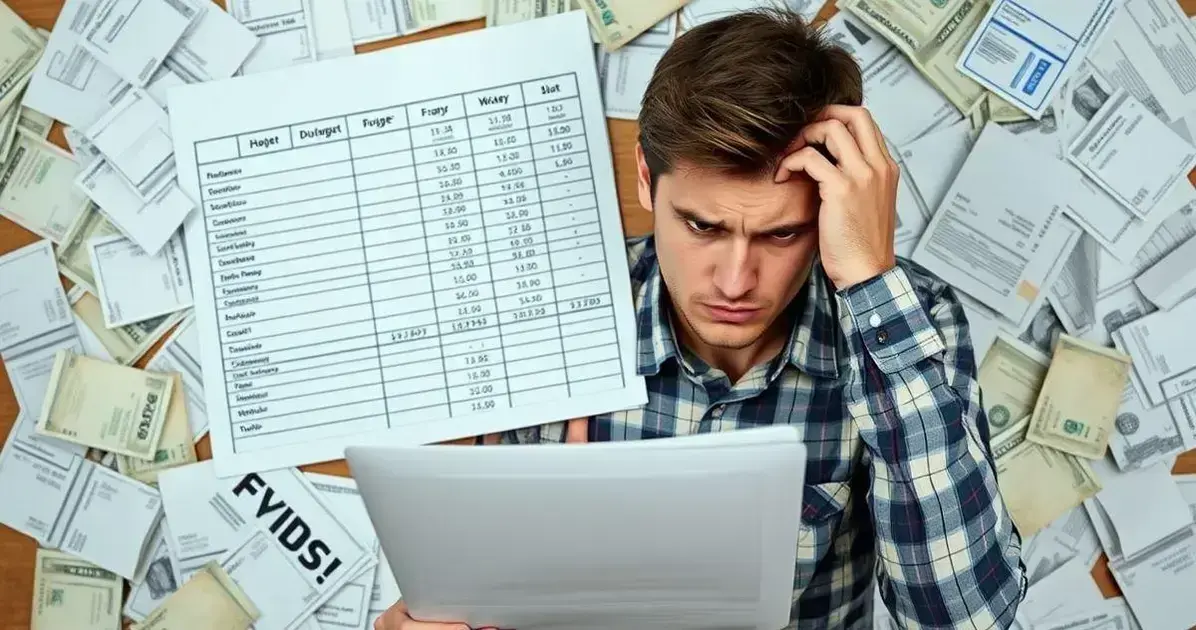Personal Budget Planning for Smart Saving
Personal budget isn’t just about numbers on a spreadsheet — it’s your personal roadmap to understanding exactly where your money goes each month. Once you take control, you’ll realize how much power you have to reshape your financial life.
Budgeting doesn’t have to be overwhelming or boring. With a few smart choices and a bit of consistency, you can avoid debt, hit your goals, and still enjoy your lifestyle without constant stress.
Curious to see how you can build a personal budget that fits your reality and helps you get ahead? Keep reading — the clarity (and freedom) you’re looking for might be just a few steps away.
What is a Personal Budget?
A personal budget is a financial plan that helps individuals track their income and expenses over a specific period. It allows you to see how much money you have coming in and where it is going. By setting limits on spending in different categories, you can manage your finances more effectively and work towards your financial goals.
Typically, a personal budget includes various elements, such as fixed expenses like rent or mortgage payments, variable expenses like groceries and entertainment, and savings goals. By monitoring these areas, you can identify where to cut back to avoid overspending.
Why Have a Personal Budget?
Having a personal budget is essential for several reasons. Firstly, it provides clarity on your financial situation. Secondly, it helps prevent debt accumulation by keeping your spending in check. Lastly, a budget can assist in planning for future expenses, such as vacations, major purchases, or savings for emergencies.
By using a personal budget, you can feel more in control of your finances. It maintains financial discipline, encourages better spending habits, and ultimately leads to achieving your financial goals more efficiently.
Importance of a Personal Budget
The importance of a personal budget cannot be overstated. It serves as a foundational tool for anyone looking to take control of their finances. Without a budget, it is easy to lose track of spending and accumulate debt, leading to financial stress.
A personal budget helps you set clear financial goals. By defining what you want to achieve, whether it’s saving for a vacation or paying off debt, a budget provides direction. It shows you how much you can save each month and helps prioritize needs versus wants.
Financial Awareness
One major benefit of a personal budget is increased financial awareness. When you track your income and expenses, you gain insights into your spending habits. This knowledge allows you to make informed decisions, enabling you to identify areas where you can cut back. Being aware of where your money goes helps you avoid impulsive purchases and fosters more deliberate, thoughtful spending.
Debt Management
A personal budget is also crucial for managing debt. By outlining your income and expenses, you can allocate funds toward debt repayment. It ensures you meet monthly payment obligations while still covering other necessary expenses. With a budget, you can develop a plan that helps you pay off debts faster and save on interest costs.
Financial Security
Moreover, budgeting contributes to a sense of financial security. Knowing that you have a plan in place can reduce anxiety about unexpected expenses. It allows you to build an emergency fund, ensuring you have a safety net during difficult times. Financial security can lead to broader well-being, as it reduces stress and enables better focus on other life aspects.
Key Components of a Personal Budget

The key components of a personal budget include several essential categories that help you manage your finances effectively. Understanding these components is crucial for creating a budget that works for you.
Income
The first component is your total income. This includes all sources of income, such as your salary, bonuses, and any additional earnings from side jobs or investments. Knowing your total monthly income is essential for building a budget that reflects your financial situation.
Fixed Expenses
Next are fixed expenses. These are costs that remain the same each month, such as rent or mortgage payments, insurance, and car loans. Tracking these expenses is vital since they usually take up a large portion of your income.
Variable Expenses
Variable expenses can change each month. These include groceries, entertainment, dining out, and shopping. It’s important to monitor these expenses to identify spending patterns and find areas where you can cut back.
Savings
Another crucial component is savings. Budgeting should include a specific amount set aside for savings each month. This can help you build an emergency fund or save for future goals like vacations or education.
Debt Repayment
If you have any debts, it’s critical to include a debt repayment plan in your budget. This should outline how much you will pay toward credit cards, student loans, or other debt each month. Prioritizing debt repayment helps reduce financial stress.
Flexible Spending
Including a flexible spending category allows room for unexpected expenses or fun activities. This component helps you accommodate surprises in your budget without feeling guilty or stressed about overspending.
By understanding these key components, you can create a personal budget that effectively tracks and manages your finances, setting you on the path to financial stability.
How to Create a Personal Budget
Creating a personal budget can seem daunting, but it is a straightforward process that can help you manage your money effectively. To help you get started, follow these simple steps.
Step 1: Gather Your Financial Information
Begin by collecting all necessary financial documents. This includes your income statements, bills, bank statements, and any other financial records. Knowing your income and expenses is crucial for building a realistic budget.
Step 2: Determine Your Income
Next, calculate your total monthly income. Include all sources of income, like your salary, any side jobs, and other earnings. This will be the foundation of your budget.
Step 3: List Your Expenses
After determining your income, list all your monthly expenses. Categorize them into fixed and variable expenses. Write down fixed expenses like rent or mortgage, insurance, and loan payments. For variable expenses, include groceries, dining out, and entertainment.
Step 4: Set Savings Goals
Decide how much you want to save each month. This could be for an emergency fund, a vacation, or long-term investments. Include these savings goals in your budget to prioritize them.
Step 5: Create Your Budget
Now, it’s time to create your budget. Use a simple spreadsheet or budgeting app to input your income and expenses. Subtract total expenses from total income. Ensure your budget balances — you should aim to have a surplus for savings or unexpected costs.
Step 6: Monitor and Adjust
Once your budget is set, regularly monitor your spending. Keep track of your expenses and compare them to your budget. If needed, adjust your budget to accommodate any changes in income or unexpected costs.
Step 7: Review Periodically
Lastly, review your budget periodically. Life circumstances change, and so should your budget. Update it to reflect new goals, changes in income, or significant expenses. This will keep your budget relevant and effective.
Tips for Sticking to Your Personal Budget
Sticking to your personal budget can be challenging, but there are effective tips to help you remain on track. Here are some actionable strategies to consider.
1. Set Realistic Goals
Start by setting achievable financial goals. Be specific about what you want to accomplish, whether it’s saving for a vacation or paying off debt. Setting realistic goals will keep you motivated and focused.
2. Track Your Spending
Monitoring your daily expenses is crucial. Use a budgeting app or a simple spreadsheet to log your purchases. This makes it easier to see where your money is going, helping you avoid overspending in certain categories.
3. Use Cash for Variable Expenses
Consider using cash for variable expenses, like dining out or entertainment. Withdraw a specific amount each week and only use that cash. This technique helps you control spending and stick to your budget without relying on credit cards.
4. Employ the 50/30/20 Rule
Following the 50/30/20 rule can simplify your budgeting process. Allocate 50% of your income to needs, 30% to wants, and 20% to savings and debt repayment. This guideline offers a balanced approach to managing your money.
5. Regularly Review Your Budget
Set a time to review your budget every month. Check if you’re sticking to your plan and adjust any categories as needed. This allows you to stay aware of your financial health and make necessary changes quickly.
6. Avoid Impulsive Purchases
Before making a purchase, ask yourself if it’s a need or a want. Implement a waiting period for non-essential purchases, such as 24 hours. This helps prevent impulsive decisions and keeps your budget intact.
7. Find Accountability
Share your budget goals with a trusted friend or family member. Having someone to hold you accountable can encourage you to stick to your budget and provide support during challenging times.
8. Reward Yourself
Acknowledge your budgeting successes. When you meet your financial goals, treat yourself to a small reward. This positive reinforcement can motivate you to continue following your budget.
Common Mistakes in Personal Budgeting

Personal budgeting can lead to better financial control, but many people make common mistakes that hinder their efforts. Here are some mistakes to avoid in personal budgeting.
1. Not Tracking Expenses
One of the biggest mistakes is failing to track expenses. Without monitoring where your money goes, it’s easy to overspend. Keep a record of all purchases to understand spending habits.
2. Setting Unrealistic Goals
Setting unattainable financial goals can lead to frustration. Make sure your goals are realistic and achievable, taking into account your current income and expenses. This will keep you motivated to stick to your budget.
3. Ignoring Variable Expenses
Many people focus only on fixed expenses and forget about variable ones like groceries and entertainment. These expenses can fluctuate significantly and should be included in your budget to avoid surprises.
4. Failing to Adjust the Budget
Life changes can affect your budget, such as a new job, marriage, or having children. Failing to revisit and adjust your budget periodically can lead to discrepancies in your financial plan.
5. Skipping Savings
Many people neglect to factor in savings in their budget. It’s essential to set aside a portion for savings each month. This helps build an emergency fund and prepares you for unexpected expenses.
6. Impulse Spending
Impulse buying can derail your budget. Avoid making unplanned purchases by creating a waiting period before buying non-essential items. This can help distinguish wants from needs.
7. Not Using Budgeting Tools
Some people don’t utilize available budgeting tools, such as apps and spreadsheets. These tools can help streamline tracking and monitoring methods, making budgeting easier and more effective.
8. Comparing Yourself to Others
It’s easy to compare your financial situation with others, but this can lead to poor budgeting decisions. Focus on your own financial goals and circumstances rather than comparing to other people’s budgets.
Putting It All Together: Mastering Personal Budgeting
Personal budgeting is a vital skill that can lead to greater financial stability and success. By understanding the definition of a personal budget and recognizing its importance, you can create a budget that reflects your financial goals.
Learning to track your income, manage expenses, and prioritize savings plays a crucial role in effective budgeting. Along the way, avoid common mistakes and be open to adjusting your budget as your circumstances change.
Using technology can enhance your budgeting experience, providing tools to make tracking and managing your finances easier and more efficient. Whether you choose apps, spreadsheets, or online banking features, the integration of technology can significantly improve your financial management.
In conclusion, taking control of your personal finances through effective budgeting, informed adjustments, and technological assistance can lead to a more secure financial future.
